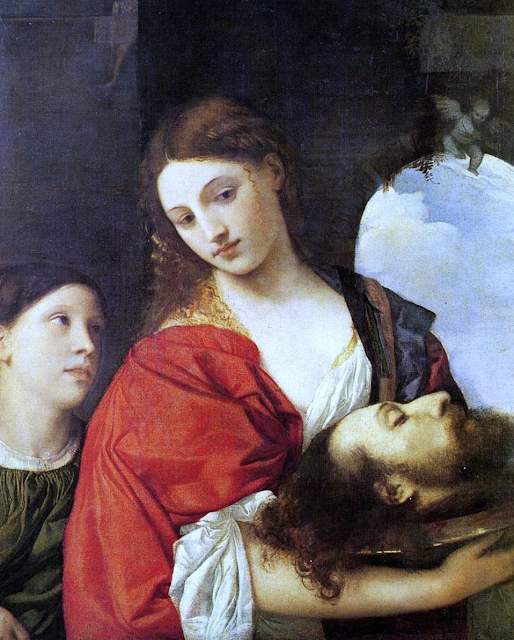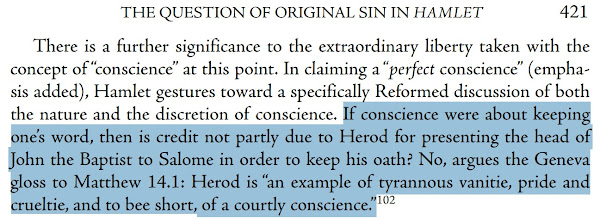Hamlet Footnotes in Need of Updates: Herod, Gonzago, & Baptista
In many editions of Shakespeare's Hamlet, when the prince gives advice to the actors and says they should avoid the kind of bad acting that "out-Herods Herod," footnotes often explain it by referring to the older Herod I, supposedly responsible for a "slaughter of innocents," a killing of male children at the time of the Nativity of Jesus—and also a biblical literary allusion to the slaughter of male infants at the time of the birth of Moses as related in Hebrew scriptures.
But Herod I is not the only Herod editors could have chosen: They could have noted a later Herod, Herod Antipas.
Why might this be a poor editorial decision, to mention only Herod I, and omit mention of Herod Antipas? Because as the Christian scriptures tell the tale (Mk 6:14-29, Mt 14:1-12), Herod Antipas divorced his first wife and married Herodias, the divorced wife of his brother. When his new stepdaughter danced for Herod Antipas and his guests, she danced so well that he offered her anything she wished—short of half his kingdom. She consulted with her mother and asked for the head of John the Baptist, who had condemned the marriage of Herod Antipas to Salome's mother because it violated Mosaic law.
Hamlet also disapproves of the marriage of a king to his brother's wife: Claudius has married Gertrude, the widow of the brother he secretly murdered. Hamlet disapproves because of the same Mosaic law that was the basis for John the Baptist's condemnation of Herod's marriage.
So if an editor of any edition of Hamlet is going to explain "out-Herods Herod," it would be better not to omit Herod Antipas and John the Baptist, even if Herod I is also mentioned. Hamlet's remark, "It out-Herods Herod," makes no explicit reference to the slaughter of the innocents, and the play does not involve the slaughter of male babies—although it does include the conspiracy by Claudius and Laertes to kill a grown prince who would be king. In both cases, Herod I and Claudius, they are trying to prevent the loss of their throne to some other party by use of killing.
Which Herod seems a better metaphor for bad, overacting? Both, actually. Someone who would slaughter male infants (like Herod I) might be accused of, well, overkill. Another who would promise anything to a stepdaughter (and then behead the prophet who condemned his marriage, like Herod Antipas) might also be accused of overacting. Either comparison works.
So including Herod I in the footnote explanation and not Herod Antipas (who is also very relevant for executing an anti-incest prophet) imposes on the text a narrow or exclusive meaning it doesn't require. This editorial choice maybe based more on knee-jerk assumptions by modern readers more familiar with the Christmas narrative than with the Herod-John-Salome narrative. Or perhaps it's based in part on a reluctance of critics in certain ages to raise the issue of Henry VIII and his first marriage to his brother's widow when discussing Hamlet, preferring the timeless Shakespeare over the human and political one.
Yet the second narrative involving Herod Antipas and John the Baptist may have been equally familiar to audiences in Shakespeare's time, after Henry VIII's marriage to, and divorce from, his brother's widow, and all the associated scandal (and the English Reformation, which stemmed in part from it). For Herod Antipas to grant Salome's wish and have the prophet John the Baptist executed relates more directly to the plot of Hamlet: The prince announces, "my prophetic soul" in conversation with the ghost at the news that Claudius killed King Hamlet to marry his brother's wife Gertrude and take the throne.
Editors make a similar omission in their footnotes on The Murder of Gonzago and the name Baptista (3.2): It is true that there was a Duke of Urbino who was supposedly killed by poison; it is also true that a predecessor, a former Duke of Urbino, had a wife named Baptista—but this is already a stretch: the poisoned duke himself was not married to a Baptista. Why mention Baptista then at all, if there's no other, more relevant reason?
So the better reason to mention the name of Baptista, the wife of the previous duke, is that her name points to John the Baptist, the prophet who disapproved of a king's marriage to his brother's wife and was killed for it (like prophetic-soul Hamlet).
Joseph Ritson (1752-1803) noted this connection, and is quoted in footnotes in older variorum editions, associating Baptista "with Gian (for Giovanni) and meaning, of course, John the Baptist."
Editors who mention only the slaughter of innocents from the biblical Nativity narrative, the poisoned Duke of Urbino, and the name of the earlier duke's wife, are encouraging a reductive interpretation of the play that points to the biblical Christmas narrative and to Italian history, and not to another biblical allusion that makes a great deal of sense. We should not assume that Shakespeare had only one meaning for the name Baptista, pointing only to Italian history: He often had two or more meanings for the use of a phrase or word.
All of this makes even more sense when Hamlet accuses Ophelia, "You jig and you amble" (dancing like Salome) in the eavesdropping scene (3.1), and when Claudius in 1.2 generously tells Laertes, "what wouldst thou beg, Laertes, / That shall not be my offer, not thy asking? / The head is not more native to the heart, / The hand more instrumental to the mouth, / Than is the throne of Denmark to thy father. / What wouldst thou have, Laertes?"
For the moment, Laertes only wants to go back to France; but later, he will ask to avenge his father's murder. In fact, Laertes will be willing to cut the throat of the responsible party in the church (4.7), and will plot with Claudius the assassination of the prince.
So there is an association between Herod offering Salome anything (up to half his kingdom), with Salome replying that she wants the head of the prophet who condemned his marriage, and Claudius seeming to offer Laertes anything, with Laertes later saying he'd slit the throat of his father's murderer, and killing Hamlet.
Behead a prophet. Slit a prophetic prince's throat in the church. Not unrelated.
This does not mean Laertes or Ophelia equal Salome. Allusions don't work like that: They shed some light, for what they're worth. They are no more Salome than Hamlet is Jonah for his sea-voyage, but the allusions shed their limited light.
For these reasons, good editions of the play should mention Herod Antipas, Salome and the beheading of John the Baptist, who condemned a king's marriage to his brother's wife, and not merely Herod I and Gonzago/Baptista links to the Dukes of Urbino.
The fact that possible biblical allusions are overlooked in many editions does not come as a surprise, however: In the years betwee the Cyrus Hoy-edited 1963 Norton Critical Edition to the 2011 edition edited by Robert S. Miola, three short biblical readings were included: Genesis 4:1-12 (not on the serpent, but on Cain's killing of Abel); Judges 11:30-40 (Jephtah); and Rom 12:17-21 (Vengeance is mine). It's a start, and better than nothing.

~~~~~~~~~~~~~~~~~~~~~~~~~~~~~~~~~~~~
Update 20 December 2021
Song Cho has an excellent article from November of 2014 on Herod, John the Baptist, and Salome echoes in Hamlet. You can find it here:
http://www.languageinindia.com/nov2014/songchohamlet2.pdf
~~~~~~~~~~~~~~~~~~~~~~~~~
UPDATE: 22 November, 2020:
See also John Gillies
Shakespeare Quarterly
Johns Hopkins University Press
Volume 64, Number 4, Winter 2013
pp. 396-424
10.1353/shq.2013.0057
Although Gillies doesn't make the connections in the quote below that I do between Salome and Laertes/Ophelia, or between Claudius and Herod Antipas who married a brother's wife, or between Baptista, the player queen, and John the Baptist who condemned Herod Antipas' "incestuous" marriage to a brother's wife, or between John the Baptist and "prophetic soul" Hamlet, Gillies does discuss Herod (Antipas), Salome, and John the Baptist in the context of Hamlet:
~~~~~~~~~~~~~~~~~~~~~~~~~~~~~~~~~~~~~~~~~~~
~~~~~~~~~~~~~~~~~~~~~~~~~~~~~~~~~~~~~~~~~~~
[Originally posted around the week of 11/5/18
on LinkedIn]
~~~~~~~~~~~~~~~~~~~~~~~~~~~~~~~~~~~~~~~~~~~
Links to a description of my book project:
On LinkedIn: https://lnkd.in/eJGBtqV
On this blog: https://pauladrianfried.blogspot.com/2017/05/hamlets-bible-my-book-project-im.html
~~~~~~~~~~~~~~~~~~~~~~~~~~~~~~~~~~~~~~~~~~~
#Shakespeare #Bible #Hamlet #Literature #LiteraryCriticism #Drama #Theatre #EarlyModern #religion #Renaissance #EnglishLiterature #Italy #Herod #Editing

Comments
Post a Comment